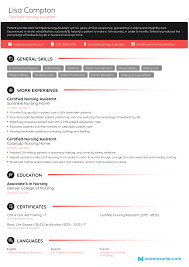Getting a job as a certified nursing assistant, or CNA, requires a great resume. To get employers to seriously consider your resume, there are certain skills you can include on your resume that employers are looking for. Working as a CNA requires a lot of time and dedication, so employers want to know that you have the right skills before hiring you.
Recommended
In this article, we’ll go over some of the most important skills to include on your CNA resume.
What are CNA resume skills?

CNA resume skills are the specific skills employers are looking for when they want to hire a certified nursing assistant. CNAs often work with sick or elderly patients, which requires a certain set of technical and communication skills. By including some, or all, of these skills on your resume, you’ll show to employers you are a good fit for the job.
Examples of CNA resume skills
Below are eight skills that you should try to include on your resume, as long as they apply to you. These are the most important skills that a CNA can have, so many employers will prefer seeing them in any candidate they consider.
-
Attention to detail
-
Verbal and written communication
-
Consistency
-
Interpersonal
-
Record-keeping
-
Knowledge of medical terminology
-
Understanding of common disorders
-
Proper hygiene
1. Attention to detail
CNAs help nurses monitor patients. They must be able to regularly record important information about the patient, such as their pulse or blood pressure. It’s also important that they observe the patients and look for signs of any changes. It’s often up to a CNA to notice a small change in a patient and alert others on their medical team.
2. Verbal and written communication
Communication is vital for any CNA. As a CNA, you should be able to effectively communicate with other members of your healthcare team, such as doctors and nurses, along with any patients in your care. CNAs will sometimes need to explain things verbally or communicate by writing, making both skills essential.
For example, a patient may ask a CNA to relay a message to their nurse. It would be up to the CNA to record an accurate message and leave a clear note for the nurse coming in later that day.
3. Consistency
When working with patients, there is an established list of protocols in place designed to keep everything running smoothly. For example, there may be a standard operating procedure for how to clean and dress a wound, or the hospital you work at may have a specific way that they want you to fill out paperwork.
4. Interpersonal skills
A big part of being a CNA is interacting with patients. You should be able to treat everyone with compassion and empathy. This requires good interpersonal skills, which will allow you to connect with your patients and make them feel more at ease.
5. Record-keeping
CNAs are often in charge of keeping records about patients. This will include writing things like the treatment your patient has received, when they received it, and how they reacted to it. Being able to keep detailed records will allow doctors and nurses to provide the best care to patients.
In many work environments, you won’t be the only person taking care of a single patient. This makes it especially important that the records kept on that patient are accurate. It will help provide other caregivers with information such as what medications the patient is on. If you’re diligent and detailed in keeping records, this is a good skill to list on your CNA resume.
6. Knowledge of medical terminology
A knowledge of infections, conditions, and the general terminology used by medical professionals is an important skill for CNAs. When you include this skill on this resume, you show your potential employer that they can trust you to follow safety protocols to keep yourself and everyone else in the establishment safe from infection.
If this is your first CNA job, you will likely gain this knowledge on the job. Many employers will train you so you know the correct way to discuss medical terminology. However, if you acquired this knowledge at a previous place of employment, you should be sure to include it on your resume.
7. Understanding of common disorders
Another acquired skill is the understanding of common disorders. CNAs who know the basics of how the body functions and what certain common disorders can do can often become more attractive candidates for a job.
If you don’t have previous work experience as a CNA but have experience with a particular disorder, you can include this on your resume. For example, if you’ve cared for a grandparent suffering from dementia while gaining your CNA license, you could list your familiarity with this condition when creating your resume.
8. Proper hygiene
All CNAs are required to maintain proper hygiene. When working closely with sick patients, they must be careful to keep diseases from spreading. For the health of their patients, CNAs must maintain proper hygiene practices throughout the day. Listing your understanding of and dedication to proper hygiene is an important skill on your resume that will show employers you take the basic requirements of your position seriously.
Sample CNA resume skills section
There are two main ways you can highlight the above skills on your resume. You can either list them directly in a skills section, or you can work them into your experience section.
CNA skills in a resume skills section
Relevant skills:
• Empathy
• Detail-oriented
• Punctual
• Hardworking
• Strong written and verbal communication
• Trained in dealing with infectious diseases
CNA skills in a resume work experience section
Certified Nursing Assistant
California General Hospital
2016 to present• Aided patients with basic care and tasks, providing personalized care to over 10 patients every day
• Maintained proper records of patients’ medical histories
• Followed health guidelines as directed by the hospital to ensure patient and coworker safety